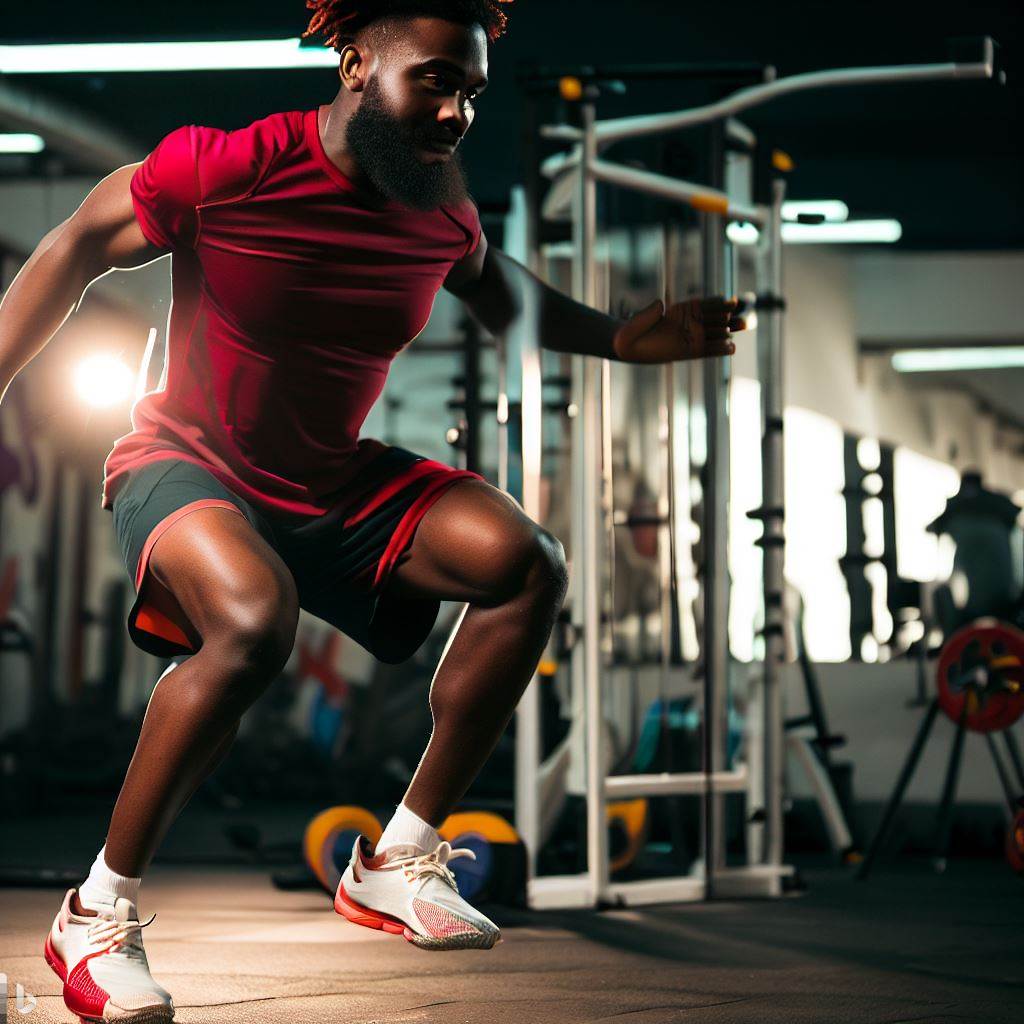Introduction
Exercise physiology is the study of how exercise impacts the body’s functions. In Nigeria, sports industry is booming, with various sporting activities and events taking place regularly.
Exercise physiology plays a crucial role in ensuring the success and development of Nigeria’s sports industry.
Exercise physiology involves understanding and enhancing the body’s response to physical activity. It focuses on factors such as cardiovascular function, metabolism, and muscular adaptations to exercise.
This knowledge helps athletes, coaches, and trainers improve performance and prevent injuries.
In Nigeria, sports industry has gained significant momentum in recent years. With the rise of professional football leagues, athletics, and other sports, the country is witnessing a surge in participation and interest.
The industry has become a platform for talent development, business opportunities, and national pride.
Exercise physiology is vital for Nigeria’s sports industry because it provides scientific knowledge to optimize performance by understanding the physiological demands of different sports, athletes can train more effectively, improving strength, endurance, and speed. Coaches and trainers can also design targeted training programs to enhance specific physiological aspects required for different sports.
Moreover, exercise physiology helps in injury prevention and rehabilitation. Understanding the body’s response to exercise helps identify potential risks, allowing coaches and trainers to implement measures that reduce the likelihood of injuries.
Additionally, exercise physiology plays a crucial role in the recovery process, helping athletes regain their physical capabilities after an injury.
Overall, exercise physiology plays a significant role in Nigeria’s sports industry.
It ensures athletes reach their full potential, enhances performance, and prevents injuries. As the country continues to develop its sports industry, the importance of exercise physiology will only grow, contributing to the success and growth of Nigerian athletes on national and international platforms.
Understanding Exercise Physiology
Define exercise physiology
- Exercise physiology is the study of how the body responds and adapts to physical activity.
- Its main objectives are to understand the physiological mechanisms that occur during exercise and to improve human performance.
Exercise physiology involves several key components:
- Cardiovascular physiology: focuses on the heart, blood vessels, and how they respond to exercise.
- Respiratory physiology: examines how the respiratory system functions during physical activity.
- Neuromuscular physiology: studies the interaction between the nervous system and muscles during exercise.
- Metabolic physiology: explores the energy systems and metabolic processes utilized by the body during exercise.
- Endocrine physiology: analyzes the hormonal responses and adaptations to exercise.
Role of exercise physiology in enhancing athletic performance
The role of exercise physiology in enhancing athletic performance is crucial.
Exercise physiologists work with athletes to optimize their training programs and maximize their potential.
- They assess athletes’ current fitness levels and develop personalized exercise plans.
- By analyzing physiological data, they can identify an athlete’s strengths and weaknesses.
- Exercise physiologists design training programs to target specific areas for improvement.
- They monitor athletes’ progress and make adjustments to ensure optimal performance and prevent injuries.
- Through exercise physiology, athletes can enhance their cardiovascular capacity, increase muscular strength, and improve endurance.
In Nigeria’s sports industry, exercise physiology plays a crucial role.
- Exercise physiologists work closely with sports teams and individual athletes.
- They contribute to the development of customized training programs that suit athletes’ specific needs.
- By understanding the physiological demands of different sports, exercise physiologists can optimize performance.
- They help athletes improve their aerobic and anaerobic capacities, which are vital in sports such as football or athletics.
- Exercise physiology also aids in preventing injuries and speeding up the recovery process.
Moreover, exercise physiologists play a vital role in talent identification and development.
- They assess young athletes’ physical abilities and identify their potential for specific sports.
- Exercise physiologists provide guidance on training and nutrition to ensure proper growth and development.
- They play a crucial role in helping athletes reach their full potential and perform at the highest level.
Therefore, exercise physiology is essential in understanding and improving athletic performance. Its main objectives include studying the body’s physiological responses to exercise and enhancing human performance.
In Nigeria’s sports industry, exercise physiology contributes to the development of customized training programs, injury prevention, and talent identification.
By working closely with athletes, exercise physiologists play a pivotal role in optimizing performance and achieving success in sports.
Read: Step-by-step Guide to Becoming a Nursing Assistant in Nigeria
Development of Exercise Physiology in Nigeria
In this section, we will trace the historical development of exercise physiology in Nigeria, discuss key institutions and organizations promoting it, and highlight milestones and achievements in the field.
Historical Development
- Exercise physiology in Nigeria has its roots in the early 20th century.
- The discipline gained recognition as an essential component of sports and exercise performance.
- Early pioneers in exercise physiology focused on the physiological responses to exercise in Nigerian athletes.
- Research studies were conducted to understand the impact of exercise and training on athletes’ performance.
Institutions and Organizations
- The Federal Ministry of Youth and Sports Development plays a crucial role in promoting exercise physiology in Nigeria.
- Universities and research institutions, such as the University of Lagos and the National Institute for Sports, actively contribute through research.
- Nongovernmental organizations, like the Nigerian Sports Science and Medicine Association, collaborate to advance exercise physiology.
- These institutions and organizations provide platforms for knowledge sharing, training, and certification in exercise physiology.
Milestones and Achievements
- One milestone in Nigeria’s exercise physiology history is the establishment of the Sports Science Research Centre in Lagos in 1981.
- The center aimed to enhance the performance and well-being of Nigerian athletes through scientific research.
- Another milestone is the inclusion of exercise physiology as a core subject in sports science curricula in Nigerian universities.
- This development has led to an increased number of exercise physiologists and researchers in the country.
- Nigeria has achieved significant advancements in understanding the role of exercise physiology in disease prevention and management.
- Research studies have explored exercise interventions for conditions like obesity, cardiovascular diseases, and diabetes.
- The country has also made progress in applying exercise physiology principles for sports injury prevention and rehabilitation.
- Nigerian exercise physiologists have contributed to international conferences, publications, and collaborations.
- Their work has contributed to the global body of knowledge in exercise physiology.
In a nutshell, exercise physiology in Nigeria has a rich history of development, driven by key institutions and organizations.
Milestones and achievements have propelled the field forward, both in sports performance and public health domains.
Read: Understanding the Demand for Exercise Physiologists in Nigeria

Application of Exercise Physiology in Nigeria’s Sports Industry
Exercise physiology helps optimize training programs
- Exercise physiology understands the physiological demands of sports.
- Exercise physiologists work with coaches and athletes to design customized training regimens.
- Exercise physiologists assess athletes’ aerobic capacity, anaerobic threshold, muscular strength, and endurance.
Provides insights into energy systems
- Exercise physiology identifies optimal training methods for individual athletes.
- Exercise physiologists analyze athletes’ movement patterns and biomechanics.
Exercise physiology helps prevent injuries
- Exercise physiologists help athletes develop injury prevention programs.
- Exercise physiologists assess athletes’ muscular imbalances and weaknesses.
- Exercise physiology improves athletes’ functional movement patterns.
Helps rehabilitate injuries
- Exercise physiologists guide athletes through structured rehabilitation programs.
- Exercise physiologists facilitate the recovery process and minimize the risk of future injuries.
Helps identify talented athletes
- Exercise physiologists assess athletes’ physiological traits.
- Exercise physiology helps identify athletes with the highest potential for success.
- Exercise physiology optimizes the growth and progression of young athletes.
Contributes to the overall development of the sports industry
- Exercise physiology maximizes performance potential.
- Athletes can achieve higher levels of performance and competitiveness.
- Coaches and sports organizations recognize the importance of exercise physiology.
- Investing in exercise physiology research and professionals is crucial for the future growth of the sports industry.
Read: Top Institutions for Sonography Studies in Nigeria
Challenges and Opportunities for Exercise Physiology in Nigeria
Integrating exercise physiology into the Nigerian sports industry comes with its fair share of challenges.
However, there are several potential opportunities and strategies that can be employed to overcome these hurdles and ensure the success of this integration.
Read: The Journey to Becoming a Registered Nurse in Nigeria
Identifying the Challenges
- Lack of awareness and understanding about the role of exercise physiology in sports performance.
- Inadequate funding and resources for research and development in exercise physiology.
- Limited availability of qualified exercise physiologists in Nigeria.
- Resistance and skepticism from coaches, athletes, and sports administrators towards incorporating exercise physiology practices.
- Insufficient integration of exercise physiology programs in sports training and management.
Exploring Potential Opportunities
Despite these challenges, there are several potential opportunities that can be leveraged to ensure the successful integration of exercise physiology into the Nigerian sports industry.
- Educational Outreach: Conducting awareness campaigns and educational programs to promote the understanding and benefits of exercise physiology among coaches, athletes, and sports administrators.
- Increased Research Funding: Advocating for increased funding and resources for exercise physiology research and development to enhance its application in sports performance.
- Professional Development: Facilitating the training and certification of more exercise physiologists in Nigeria to meet the demand for their expertise in the sports industry.
- Collaborative Partnerships: Fostering collaboration and partnership between exercise physiologists, coaches, and sports administrators to integrate exercise physiology practices into sports training and management effectively.
- Performance Enhancement: Demonstrating the role of exercise physiology in improving athletic performance through evidence-based research and success stories.
Strategies for Overcoming Challenges
To overcome the challenges faced in integrating exercise physiology into the Nigerian sports industry, several strategies can be implemented:
- Advocacy: Championing the importance of exercise physiology and its potential contribution to sports performance through advocacy efforts.
- Collaborative Workshops: Organizing workshops and seminars to facilitate knowledge sharing and collaboration among exercise physiologists, coaches, and sports administrators.
- Skill Development: Providing training and continuing education opportunities for exercise physiologists to enhance their skills and knowledge.
- Policy Support: Working with sports governing bodies to develop policies that promote the integration of exercise physiology into sports training and management.
- Performance Monitoring: Establishing performance monitoring systems that incorporate exercise physiology metrics to assess and enhance athletes’ performance.
The Importance of Collaboration
Collaboration between exercise physiologists, coaches, and sports administrators is crucial for the successful integration of exercise physiology into the Nigerian sports industry. This collaboration can:
- Ensure the implementation of evidence-based exercise physiology practices in sports training and management.
- Facilitate the exchange of knowledge and expertise between different stakeholders.
- Improve athletes’ overall performance and reduce the risk of injuries through well-designed training programs.
- Promote a holistic approach to sports performance that considers both physical and physiological aspects.
- Enhance the credibility and recognition of exercise physiology as a valuable discipline within the Nigerian sports industry.
In short, while there are challenges to integrating exercise physiology into the Nigerian sports industry, there are also significant opportunities and strategies available to overcome these hurdles.
By raising awareness, advocating for resources, fostering collaboration, and emphasizing the importance of exercise physiology, Nigeria can harness the potential of this field to enhance sports performance and ultimately elevate its sports industry to new heights.
Read: Career Scope for Diagnostic Medical Sonographers in Nigeria
Future Perspectives and Recommendations
Continuous research and education play a crucial role in the field of exercise physiology, and their importance should not be underestimated.
Advancements and Trends in Exercise Physiology
Advancements in technology have significantly influenced the field of exercise physiology over the years.
These advancements have provided opportunities for more accurate data collection and analysis, leading to more precise training methods and improved performance in sports.
In the future, Nigeria’s sports industry can benefit from the following advancements and trends:
- Integration of Wearable Technology: Wearable devices such as heart rate monitors, activity trackers, and GPS watches can provide real-time data on an athlete’s physiological responses during training and competitions. This information can help coaches and sports scientists optimize training programs and prevent injuries.
- Virtual and Augmented Reality: The use of virtual and augmented reality can enhance training experiences by simulating different sports scenarios and enabling athletes to practice in a controlled and immersive environment. This technology can improve decision-making, reaction time, and specific skills required in various sports.
- Data Analytics and Artificial Intelligence: The analysis of big data collected from athletes can provide valuable insights into their performance trends, injury risk factors, and individualized training needs. Artificial intelligence algorithms can then be used to generate personalized training plans and optimize recovery strategies.
Read: Occupational Therapy Schools: Where to Study in Nigeria
Recommendations for Development and Integration
To further develop and integrate exercise physiology in Nigeria’s sports industry, the following recommendations should be considered:
- Increased Funding: Adequate funding should be allocated to sports science research and development programs, enabling the establishment of state-of-the-art laboratories and the recruitment of qualified exercise physiologists.
- Collaboration and Partnerships: Collaboration between sports organizations, government agencies, universities, and private sectors can facilitate knowledge exchange, infrastructure sharing, and joint initiatives to promote the integration of exercise physiology in sports training programs.
- Education and Certification: Efforts should be made to enhance the availability of education and certification programs in exercise physiology. This will help produce a competent workforce of exercise physiologists who can contribute to the sports industry’s growth.
- Professional Development: Continuous professional development opportunities, such as conferences, workshops, and research grants, should be provided to exercise physiologists to encourage ongoing learning and research in the field.
Importance of Continuous Research and Education
The field of exercise physiology is dynamic, and continuous research and education are of utmost importance.
This ensures that professionals stay updated with the latest advancements, techniques, and evidence-based practices. It also allows for the discovery of new insights and solutions to enhance athlete performance, minimize injuries, and optimize training protocols. Continuous research and education also contribute to the growth and reputation of Nigeria’s sports industry at a global level.
Generally, the future of exercise physiology in Nigeria’s sports industry holds tremendous potential for advancements and integration.
By embracing technology, fostering collaboration, investing in education and research, Nigeria can unlock the full benefits of exercise physiology in optimizing athlete performance, injury prevention, and overall growth of the sports industry.
Read: Decoding the Skillset of a Successful Cardiovascular Technologist
Conclusion
Exercise physiology plays a crucial role in Nigeria’s sports industry. It serves as a scientific foundation for optimizing athletic performance, preventing injuries, and enhancing recovery. Athletes benefit from exercise physiology through improved endurance, strength, speed, and overall physical fitness. Coaches can develop more effective training programs based on scientific principles, leading to better performance outcomes.
Additionally, exercise physiology contributes to the overall sports industry in Nigeria by providing evidence-based strategies for talent identification and development. It enhances the professionalism of sports by incorporating scientific methods into training and rehabilitation processes. The potential benefits of exercise physiology in Nigeria’s sports industry are immense. It has the power to revolutionize the way sports are prepared for and executed in the country.
By integrating exercise physiology practices into sports programs, Nigeria can improve its competitiveness on a global scale and produce world-class athletes.
Furthermore, the application of exercise physiology principles can foster a culture of health and fitness among the Nigerian population, leading to a more active and healthier nation.
Thus, investment in exercise physiology is crucial for the advancement of the sports industry in Nigeria.




